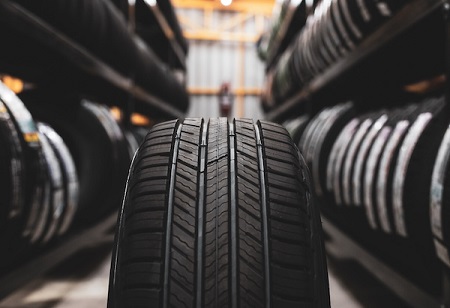
The automobile industry is facing difficulties as a result of the expanding client demands. Customers' top concerns include attractive appearance, great performance and durability, and cost effectiveness. The demand is somewhat comparable for all of the vehicle's internal and external components as well, driving every car market sector towards cutting-edge technological development and high-quality product manufacturing. One of the most crucial components of a car is its tyres because they are the only point of contact between the car and the road. It supports the entire weight of the car and promotes safe road driving. Due to growing customer concerns about the use of conventional tyres, there is an increase in the market demand for advanced tyres.
Advanced tyres include self-inflating, chip-embedded, multi-chamber, and all-in-one models. The convenience of customers inside their vehicles can be greatly increased by these cutting-edge tyre technology. Modern tyres are made up of many parts that can be combined in different ways. The main issue with conventional tyres is eliminated because these tyres are often airless and impervious to punctures. They offer a solid grip on surfaces and work well during high-speed travel and on wet surfaces. Advanced tyres are more fuel-efficient than regular tyres because they have a reduced surface contact area. The market offers the following notable tyre technologies:
Chip Embedded tyres
Numerous tyre manufacturers are joining the drive to integrate RFID into tyres, use it to optimise various management functions, and develop a new business model. The idea behind Michelin is to use RFID tags to connect tyres to the Internet of Things. It anticipates that those tags will be utilised to control tyre usage history throughout their entire lifecycle, from manufacturing to mounting to use after being introduced to the market to disposal. Trucks, buses, and other commercial vehicles, for instance, use tyres that have had their worn rubber changed.
They're referred to as retreat tyres. By incorporating RFID into tyres, it is now possible to manage mounting location, time and date, number of repairs, and other details about tyres for the vehicle simply by scanning the ID stored in the RFID tag with a portable scanner. To assure traceability and improve operations, Michelin also intends to employ the same RFID tags.
Self-inflating tyres
Vehicles with self-inflating tyres can adapt to the road's current conditions for the best performance and safety. Many consumer cars today come with pressure-monitoring devices, but without an outside air source, the driver has little control over the situation. There are many self-inflating tyre systems available, however the majority of them are primarily used in commercial and military settings. Of course, the CTIS system on the Hummer is the exception.
The tread of tyres wears down more quickly when they are underinflated. For every 20% that they are underinflated, you may drive 15 percent fewer miles on them, according to Goodyear. In addition to overheating more quickly than properly filled tyres, underinflated tyres also suffer more tyre damage. The fading regions below show where the tread has worn excessively.
Tyres flatten at the bottom when they roll because they are flexible. After losing contact with the earth, this contact patch returns to its former shape. This rebound causes some friction and a wave of motion. The wave is stronger and the friction produced is greater when there is less air in the tyre; friction produces heat.
Airless tyres
The manufacture of airless tyres has begun. Many tyre manufacturers have developed their own airless prototypes. The weight of the car, its occupants, and its load can be supported by these tyres without the requirement for air pressure.
They have spokes in their "internal structure" that keep the tire's optimal form. The footprint of the tyre and these spokes cooperate to maintain surface contact during the drive. You never have to worry about your tyres leaking with airless tyres since, as you probably already knew, non-pneumatic tyres don't have any air to leak. This function will sound innovative to the majority of drivers. Because tyres without air cannot go flat, you won't have to worry about a flat tyre if you run over a sharp object in the road. All drivers would be happy to see the days of changing a tyre on the side of the road come to an end.
You don't need to bring a spare because you won't be replacing or fixing a flat. Similar to vehicles with run-flat tyres, this feature may allow for more room in the trunk. The absence of a spare also reduces weight, and lighter vehicles have greater fuel economy. Airless tyres may also have additional unique benefits for trucks used in industrial settings. Tyre failure can lead to a reduction in production and efficiency in the farming, mining, and construction industries. The development of airless tyres would be a welcome improvement.
The global market for advanced tyres is being driven by increased auto production, rising customer demands, and decreased vehicle maintenance costs. For the creation of new products, their introduction, and increased market penetration, industry participants are utilizing a variety of strategic techniques, such as partnerships, investments, innovation, and collaborations. According to Allied Market Research, the market for innovative tyres would expand significantly between 2020 and 2030.
The advanced tyre sector faced a number of difficulties as a result of the Covid-19 outbreak, particularly in the early stages. Throughout the time, the market expansion was hampered by a lack of raw resources, a labour shortage, rising raw material prices, disrupted supply chains, constrained transportation, import and export restrictions, and rising inventories. The industry suffered as a result of these issues. The market for advanced tyres is anticipated to see increasing demand in the future and quickly recover financially thanks to ongoing advances in the sector.
We use cookies to ensure you get the best experience on our website. Read more...